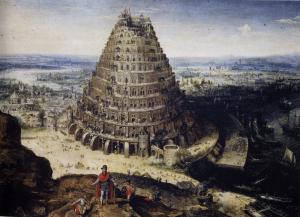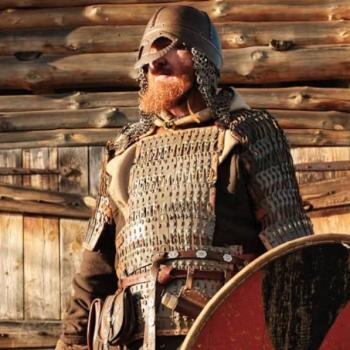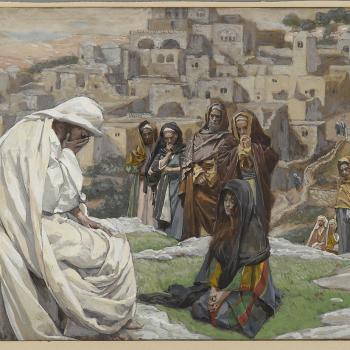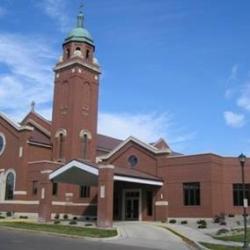 The Tower of Babel was meant to reach the sky. This post explains what a scary prospect that is and draws parallels with some of our frightening technological possibilities today.
The Tower of Babel was meant to reach the sky. This post explains what a scary prospect that is and draws parallels with some of our frightening technological possibilities today.
Episode 6 of the Rowing with Michael Series: A journey through the Jewish/Christian Scriptures in Verse and Commentary. Introduction and Contents for this series HERE.
Michael, row the boat ashore. Alleluia….
- The Tower of Babel was rising high. Alleluia.
- People bragged they would reach the sky. Alleluia.
- All at once the Lord came down, Alleluia.
- Scattered those babblers all around. Alleluia.
“Baby,” “babbling,” “Tower of Babel”
Daughter Marit and two grandchildren were visiting and Marit asked three-year-old Stella to sing for baby Dominic. So she did. She sang the ABC song and “Ba Ba Black Sheep” and then another song. I think this one was called “Hanna Bressa Waresah, Hanna Wasa Du.” That’s a language that I have forgotten how to speak. It shows the connection between “baby” and “babble,” though.
The dictionary says “babble” started out as a repetition of the babyish syllable “ba.” I always thought these words came from the Bible’s story of the Tower of Babel, but the Online Etymology Dictionary says, “No direct connection with Babel can be traced.”
The series of stories in the Bible up to and including this one follow a definite theme: God’s creation is good, but humankind introduces evil into the world. And this evil is steadily increasing. Funny thing is there’s hardly a clue as to just what these evil things that we keep doing are. There’s the disobedience of Adam and Eve, of course; but it’s not as though eating a piece of fruit in itself is evil. Then came the first murder. Other than that all we hear is something like “The Lord saw that the wickedness of man was great in the earth, and that every imagination of the thoughts of his heart was only evil continually.” It’s like being brought to trial without being told what the charges are.
The sin of pride
Maybe the story is telling us we’re not so dumb. We know what we’re doing wrong. At any rate, the Babel story finally specifies one charge: Folks are building a tower. How terrible! God seems to be condemning qualities that we value highly today—ingenuity and accomplishment. We shoot a rocket clear out of the Solar System, but God gets upset when the Babylonians build a tower to the sky.
I mention the Babylonians because the prototype for the Tower of Babel story may have been one of the ziggurats, pyramid-like structures found in the area around the Tigris and Euphrates Rivers. There was one in the city of Babylon. These people had no intention of reaching the sky. The ziggurats were meant as a place where a god could come down and stay awhile. If there was any pride in it, it was about the same as the pride the Israelites justly took in their temple.
But pride was the sin of the tower builders as the story comes down and as it’s been understood traditionally. They wanted to “make a name for ourselves.” The storyteller might have mentioned at the start that any resemblance between characters in the story and real Babylonians is purely coincidental. The Bible story isn’t about any particular individuals but all of us.
The scary part
I suspect the Israelites might have seen another side to the sin of building this tower “with its top in the heavens.” And there are frightening parallels in today’s world. We now know that we could create a “nuclear winter” and wipe out most higher forms of life in a nuclear war. Global warming, left unchecked, can be nearly as ruinous. And there are powers scientists are now gaining over the building blocks of life. We can modify genetics, maybe even someday engineer a new type of human, or a new disease, or create life from scratch. What human accomplishment could scare an ancient Israelite as badly as some technologies scare people today? A tower to the sky could.
Part of the appeal of the Tower of Babel story, as ancient Israelites told and retold it around evening campfires—I’m guessing now—is that it wasn’t just a morality tale about evil, prideful people. It was a delightfully scary story. It must have set impressionable minds to imagining all sorts of terrible possibilities. A look at Israelite science explains.
The sky according to the worldview of peoples in the ancient Near East is an upside down bowl fitted down tightly over the earth, holding out the water that completely surrounds us. The sun, moon, planets, and stars travel around the inside surface of this bowl. The sun and moon, of course, have a lot of influence down here on earth. Most ancient people believed that the stars and planets did, too. Scattered around the bowl are floodgates so God can let down just the right amount of water from above the firmament.
Now imagine a band of humans have just built a tower to the sky. Imagine that once there they can maneuver around this bowl. They might open the floodgates and flood the world again just so a few could have it all to themselves. They could change the courses of the lights in the sky, messing around with the cycles of life below. No wonder God says, as he sees this tower going up
If now, while they are one people, all speaking the same language, they have started to do this, nothing will later stop them from doing whatever they presume to do. (Genesis 11:6)
Humankind, having climbed outside and above nature, would have no limits. Back then some people knew that was a disastrous situation. I’m hoping it’s not too late to relearn what God’s people knew long ago. God is not going to come down and stop us from doing whatever we propose to do, as he does in the Tower of Babel story.
A look back and ahead
With the Tower of Babel we’ve come to the end of the introduction to the main theme of the whole Bible. The first 11 chapters of the Book of Genesis set the stage for the rest of the Bible story. They specify the relevant characteristics, according to Israelite belief, of the world in which God acts—a world where sin abounds and which, left to itself, is completely hopeless. This introduction to the Bible story says in no uncertain terms: God is our only hope.
These are stories. The real world was never completely hopeless. God never actually left the world on its own. The whole series from the Fall to the Tower of Babel, especially the last story, expresses in a creative way what the Israelites believed the world would be like without God and God’s mercy toward the world.
This last story is unlike the others. It doesn’t have a happy ending or even a moderately hopeful one. All the previous stories do. God drives Adam and Eve out of the garden, but at the end he makes some new clothes for them to wear. Then God sends Cain into exile for killing his brother but gives him a mark to protect him. Later God destroys the world by flood, but he saves one family and all the animal species. And God makes the rainbow, a sign that he won’t do it again.
In the story of the Tower of Babel, God prevents the building of the tower, and scatters the people all over the earth amidst a din of babbling voices. And that’s all the grace there is in this story, though it’s grace indeed. As a line from C. S. Lewis (in That Hideous Strength) explains, mercy imposes a limitation on man’s power “as a protection from the full results of his fall.” It’s a negative kind of saving grace and a marvelous bit of story-telling restraint. The real saving grace, which we call Salvation History, is about to begin—in the very next chapter of the book of Genesis.
- Now the introduction’s done.
- Salvation’s story has begun.











